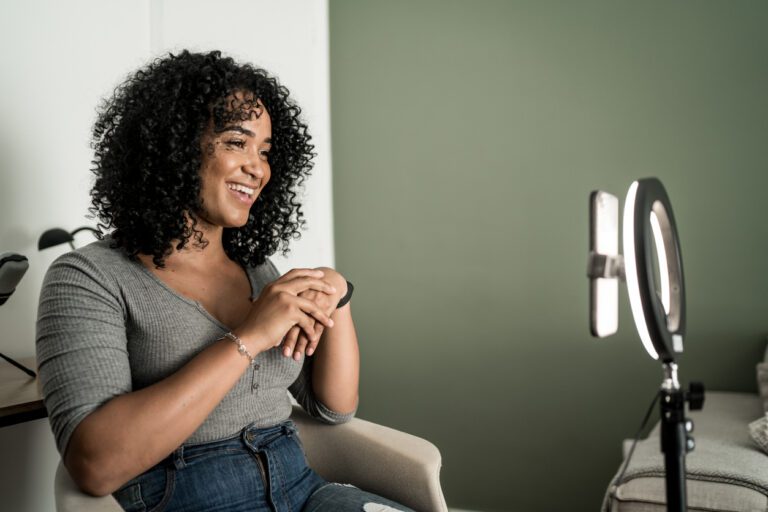Having an acting career can be expensive. There are so many things you need to spend money on in order to start (and continue) your artistic career: headshots, acting classes, audition outfits, dance training, travel and more.
Not to mention so many actors are living in high-cost-of-living cities, giving less wiggle room financially to invest into your creative career.
Add in the uncertainty of booking gigs, feeling like everyone else has it figured out but you, plus the fear of not “making it,” and it’s easy to feel the need to spend money on everything that could possibly help you.
These fearful and rushed feelings can have you investing in things that may not give you a great ROI (return on investment, i.e. getting your money’s worth), or may not be the things that are most important to your career at this moment.
For example, spending money on a website designer and branding expert at the beginning of your career when you may be better served using that money on acting classes to network with other artists and hone your skills.
You also may be experiencing fear around spending any money on your acting career at all, which could be holding you back from seeing growth and forward movement in your artistic success. For example, having your friend take your headshots for free instead of paying a professional photographer may keep you from standing out on your casting profiles.
Where you spend your money shows you what you value, and being a good steward of your money (aka managing it well) will help to keep you in your creative career long-term.
I’m going to walk you through the three questions you need to ask yourself before spending money on your acting career. This will help you to make responsible, intentional investments in your acting career that will help you grow, while also not draining your bank accounts.
1. How much have you spent on your acting career in the past 12 months?
You can create a list in your Notes app, or use free bookkeeping software (like Wave) to calculate this.
Is it more than you expected? Less? How do you feel about the investments you made?
If you feel like you spent more than you wanted to, circle the ones that had the biggest impact on you (whether it’s more callbacks, a stronger sense of confidence or the most fun you’ve had in an acting class).
If you spent very little, reflect on what else you spent money on this year and if you’d like to rebalance it and put more into your artistic dreams. This could be something as small as one $25 drop-in improv class a month.
Knowing the actual numbers here is the first step to making intentional, responsible financial investments in your acting career.
2. What’s the ROI?
Return on investment is always important to think about. If you’re spending money on something, you want to have a specific reason for what it will give you in return.
Side note: Apply this principle to every single thing you spend money on and watch your entire financial life improve!
If you want to invest in new headshots, ask yourself why. Have a stronger reason than “It’s been a while.” Do you want to increase the audition requests you receive from Casting Networks? Does your agent want to brand you differently based on who’s been calling you in? Will new shots that you’re obsessed with help you submit more than you currently are?
Having a specific reason in mind will also help you decide what you invest in. Each of these three reasons listed above may lead you to three different headshot photographers, or determine which kind of package you book with them.
Instead of the generic, “I need to get back in dance class” reason, get clear on your why. “I’ve been getting called in for musicals with tap recently, and I want to feel confident taking up space in the front of dance calls, so I’m going to find an intermediate tap class to help me brush up.”
3. Does it fit into your current finances?
If your investment does not currently fit into your finances, ask yourself how much more do you need to have in your bank account, or how much do you need to increase your income by in order for this investment to fit comfortably into your budget?
Have a money date to look at your finances and assess what you can spend on your acting career over the next six months. It should either be able to fit into your monthly expenses (i.e. weekly vocal coaching) or be able to come out of your savings in one chunk (i.e. installing an at-home VO studio).
Check out this article on how to create a money plan with fluctuating income so you know how much you are able to put toward your artistry.
When you stretch yourself too thin financially, that stress can bleed into your auditions and start to stifle your creativity, which is what you don’t want when trying to grow your acting career!
If you’re going to put something on a credit card, or invest in something before you have the money sitting in your bank account, I recommend only doing one of these at a time. Invest in the thing, get your ROI and pay it off.
Use these three questions to reflect on your past investments as well. This will help you get clear on the things that moved the needle for your artistry and felt good for you, versus the things you did because you thought you “had to,” or that you might not have been ready for.
Financial reflection like this will inform your future investments, and help to make every one of them feel good in your brain and bank account, as well as actually giving you a return on your investment (financial or emotional)!
At the end of the day, acting is a business, and you are the product. This means you need to have a business mindset about how you invest in yourself and your career in order for it to thrive. Now go make magic!
Thinking about joining Casting Networks? Sign up for a free trial today!
You may also like:













